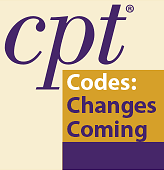Major CPT Coding Changes Coming Soon: Start Preparing Now

Major changes to the codes in the psychiatry section of the AMA’s manual on Current Procedural Terminology (CPT)—the codes used for billing and documentation for all insurers—will go into effect on January 1, 2013. There are five essential areas in which the psychiatric codes are being revised, eliminated, or refined:
| •. | Changes to the current diagnostic evaluation code (90801) to distinguish whether the evaluation included medical work or did not. The new codes (90792 and 90791, respectively) provide for a distinction between an initial evaluation with medical services done by a physician or nurse practitioner and an initial evaluation done by a nonmedical practitioner. | ||||
| •. | Refinement of psychotherapy codes, keyed to three levels of time spent with the patient, and inclusion of “add-on” codes when psychotherapy is provided in conjunction with E/M work (for example, medication management). Three new timed codes (30 minutes, 45 minutes, and 60 minutes) can be used for psychotherapy alone in all settings. Additionally, new “add-on” psychotherapy codes can be used when psychotherapy is done in the same encounter as an E/M service. Add-on codes are codes that can be used only in conjunction with another, primary code. In this case they would be used with the general E/M codes (99XXX series codes). | ||||
| •. | Elimination of the pharmacologic management code (90862) and its replacement with existing E/M codes (99XXX series codes). The standard psychiatric pharmacologic management code has been eliminated; psychiatrists can use an appropriate E/M code when they do pharmacologic management. This change should benefit psychiatrists by permitting them to use an E/M code that reflects the medical and psychiatric complexity of the patient and by allowing use of the psychotherapy add-on codes in conjunction with an E/M code. | ||||
| •. | A new add-on code for “interactive complexity.” In lieu of the current separate codes for interactive evaluation psychotherapy, a new add-on code for “interactive complexity” can be used when the patient encounter is more complex. This can include situations in which there is a need to manage maladaptive communication among participants in therapy, when caregivers’ emotions or behaviors interfere with implementing the treatment plan, or when there is evidence of a sentinel event that mandates a report to third parties. This add-on code can be used in conjunction with an initial evaluation, psychotherapy, and group psychotherapy. | ||||
| •. | A new code for psychotherapy with a patient “in crisis.” This code can be used when a practitioner performs an urgent assessment and history of a crisis state, a mental status exam, and a disposition. Treatment in such a crisis might include mobilization of resources to defuse the crisis and restore safety and implementation of psychotherapeutic interventions to minimize the potential for psychological trauma. When a crisis encounter goes beyond 60 minutes, an add-on code for each additional 30 minutes can be used. Psychiatrists have the option of billing an E/M code to describe this work as well. ■ | ||||
Specific information about the CPT code changes can be found on APA’s Web site at www.psychiatry.org/cptcodingchanges. To view a video telling APA members how they can prepare for the CPT code changes, go to http://vimeo.com/51713937.



